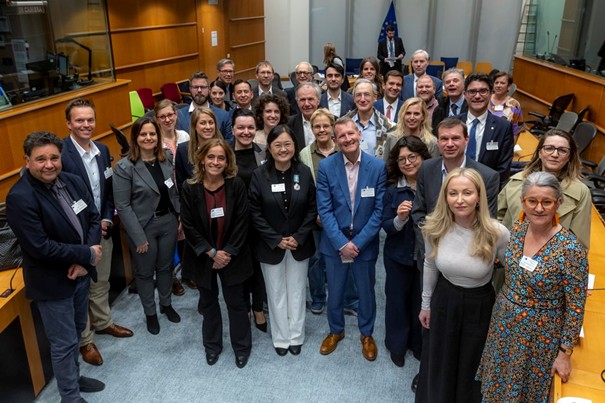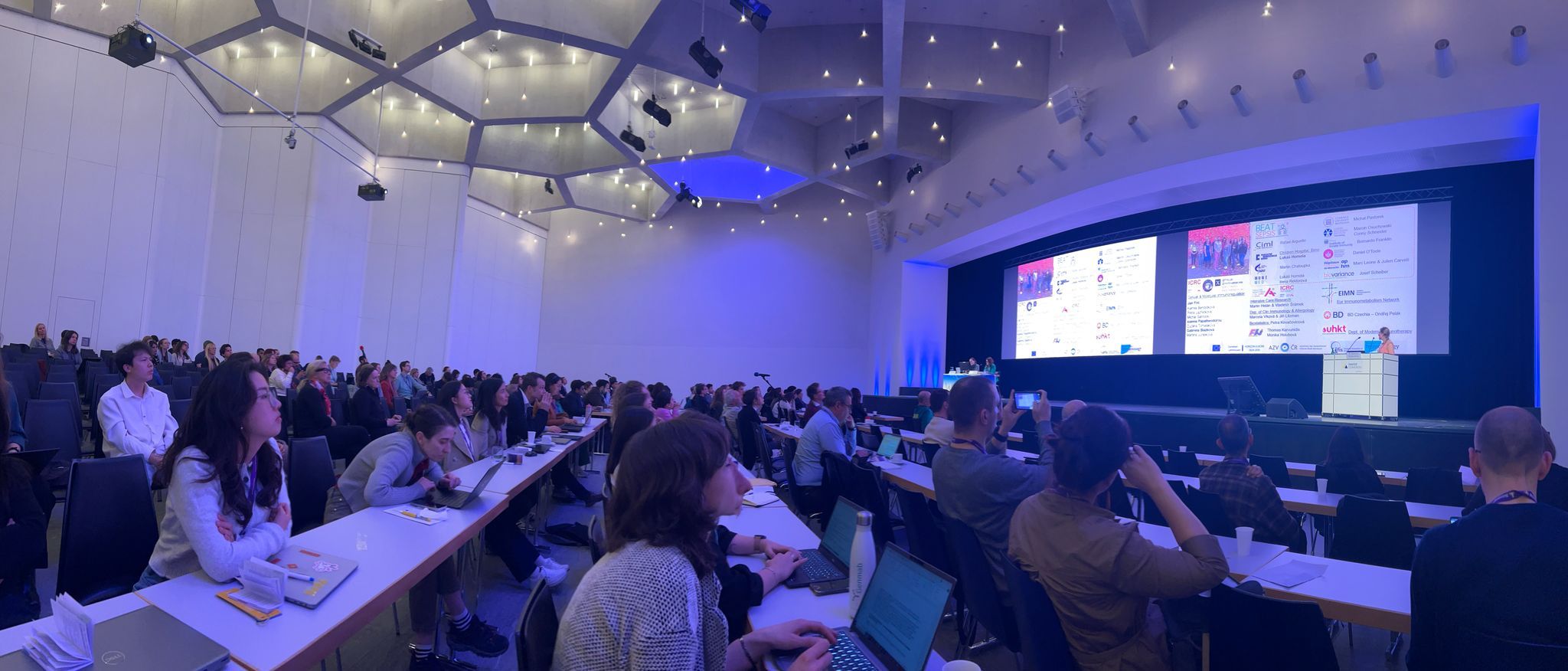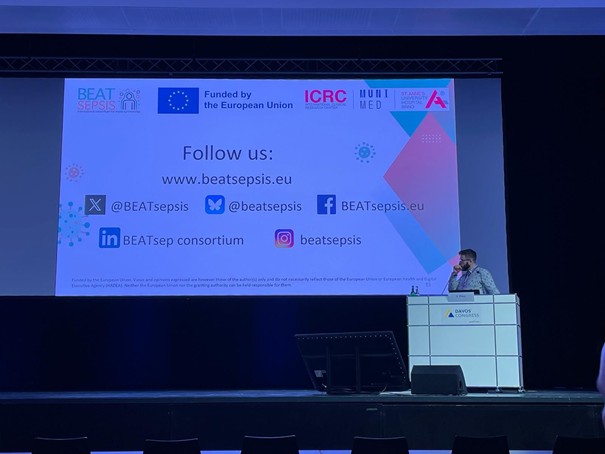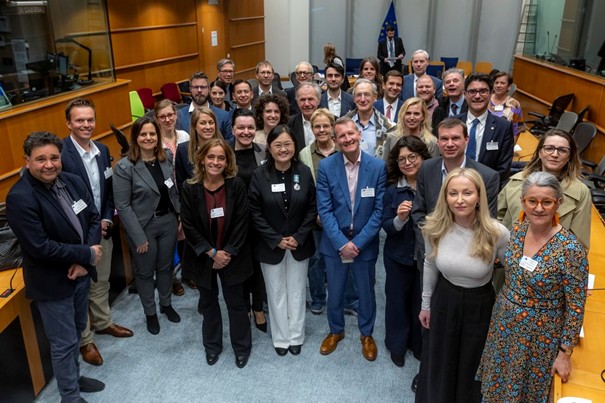ICRC representatives attended a session on sepsis at the European Parliament
In March, Jan Frič and Marcela Hortová Kohoutková, senior researchers of the Cellular and Molecular Immunoregulation team, represented the International Clinical Research Center (ICRC) at two major international forums. At the annual meeting of the European Sepsis Alliance (ESA), held at the European Parliament, they actively contributed to expert discussions on the challenges in diagnosing, treating, and researching sepsis. They also spoke at the prestigious World Immune Regulation Meeting (WIRM) in Davos, Switzerland, where they presented their latest research findings in the field of immunology and sepsis. Their participation in these events not only highlights the high standard of Czech science but also strengthens international collaboration and brings new momentum to the development of innovative diagnostic and therapeutic approaches.

The Annual Meeting of the European Sepsis Alliance (ESA) took place on 19 March 2025 under the patronage of Vytenis Andriukaitis, Member of the European Parliament and ESA Patron. The main theme of the meeting was the urgent need to integrate political efforts into addressing sepsis and related issues. The discussion focused on how sepsis preparedness is essential to strengthening the overall public health strategy within the European Union. Participants shared their experiences with best practices and presented concrete proposals for solutions. “By working together, we can save lives and prevent suffering caused by this devastating medical emergency”, said Vytenis Andriukaitis in his opening remarks.
“The majority of units [in Europe] do not have standardised screening; there is no standard operating procedure (SOP) for management of sepsis; 70% of the hospital have no training or quality improvement program; almost 90% of the labs have limited service just for blood cultures”, added Prof. Evangelos J. Giamarellos-Bourboulis, Chair of the European Sepsis Alliance and stressed on the critical need for enhanced awareness and better management of sepsis within healthcare systems.
The meeting brought together healthcare professionals, researchers, policymakers, sepsis survivors, and healthcare leaders. It addressed the necessity of a coordinated approach and reaffirmed its commitment to the Global Sepsis Agenda 2030, the first global strategy developed under the leadership of the Global Sepsis Alliance, with the participation of 70 partner and member organizations and regional alliances across Europe, North and South America, Africa, Asia and the Pacific, the Caribbean, and the Eastern Mediterranean.
“The panel discussion at the European Parliament gave us the opportunity to encounter a wide range of perspectives on the issue of sepsis, blending the expertise of professionals with the experiences of patients themselves. It is precisely this combination of scientific and personal insight that forms the foundation for meaningful change and interdisciplinary collaboration,” said Jan Frič, head of the Cellular and Molecular Immunoregulation team and coordinator of BEATsep, an international consortium dedicated to researching the consequences of sepsis and septic shock.
“One of the inspiring stories shared was that of triathlete Shahrzad Kiavash. In March 2012, she suffered a rare form of sepsis that nearly claimed her life. Doctors initially gave her only a minimal chance of survival. Miraculously, she pulled through, but ultimately both of her legs had to be amputated. Despite this, in 2015 she completed her first triathlon, and a year later competed at the Paralympic Games in Rio,” said Marcela Hortová Kohoutková, co-coordinator of the BEATsep project. “It was a powerful and inspiring story,” she added.
In March, Jan Frič and Marcela Hortová Kohoutková accepted an invitation to present their findings at the 19th World Immune Regulation Meeting, held in Davos, Switzerland. Their lectures, delivered at one of the most prestigious immunology congresses in Europe, were attended by more than 600 scientists and immunology experts.
Jan Frič spoke about mucosal organoids as tools for sepsis research, while Marcela Hortová Kohoutková presented on the long-term effects of sepsis on the immune system in children—specifically on innate immune cells and their immunometabolic status, meaning how these cells function in terms of energy and metabolism during immune responses. “After surviving sepsis, immune function is often persistently weakened—a condition known as sepsis-induced immunosuppression. This increases the risk of recurrent infections and may impair responses to routine vaccinations,” she explained.
“Part of our research also focuses on identifying new biomarkers—measurable indicators in blood or cells—that could show whether a child who has recovered from sepsis still suffers from immunosuppression. The goal is to detect at-risk patients early and adjust their treatment or increase monitoring accordingly. This is not only crucial for managing sepsis itself but also for the long-term health of affected children,” she added. For her contribution, she received a Travel Award from the European Federation of Immunological Societies and the European Journal of Immunology.
“Our conference presentations were the result of the intense and dedicated work of the entire Cellular and Molecular Immunoregulation team. We worked right up to the last minute to be able to present the most up-to-date data at the conference,” added Jan Frič.

Marcela Hortová Kohoutková during her presentation

Jan Frič



